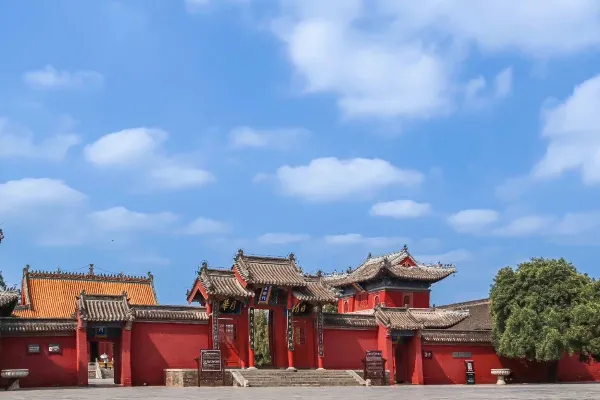
The Taihao Fuxi Mausoleum Cultural Tourism Area is located in Huaiyang District, Zhoukou City, Henan Province. As a national 5A-level tourist attraction and a key cultural relic protection unit of China, it covers an area of 875 mu (about 58 hectares) with a construction area of 50,000 square meters. It is the largest and best-preserved Fuxi sacrificial architectural complex in China. Built during the Spring and Autumn Period over 3,000 years ago, it is renowned as the "First Mausoleum under Heaven" and serves as the tomb temple of Taihao Fuxi, the cultural progenitor of the Chinese nation.
History and Culture
Taihao Fuxi is considered the cultural progenitor of the Chinese nation, ranking first among the Three Sovereigns. Historical records indicate that Fuxi established his capital in Wanqiu (modern Huaiyang), created the Eight Trigrams, instituted marriage customs, standardized surnames, invented writing, and made fishing nets, thus initiating Chinese civilization. As Fuxi's final resting place, Huaiyang's Taihao Mausoleum has been a sacred site for Chinese descendants to trace their roots and worship ancestors since ancient times.
The mausoleum complex was initially built during the Spring and Autumn Period, expanded during the Tang Dynasty, and perfected during the Ming and Qing dynasties through successive renovations. Constructed according to Fuxi's Primordial Eight Trigrams theory, the complex features rigorous layout and grand scale, embodying the essence of ancient Chinese architecture. The annual temple fair held from the 2nd day of the 2nd lunar month to the 3rd day of the 3rd lunar month has a history of several thousand years and is listed as a national intangible cultural heritage.
Main Attractions
Noon Court Gate
The first gate of Taihao Mausoleum, built during the Ming Dynasty with five-bay width and three-bay depth, featuring single-eave hip-and-gable roof in typical Ming official architectural style. The inscription "Taihao Mausoleum" above the gate was personally written by Emperor Jiajing of Ming.
Primordial Gate
Named after Fuxi's creation of the "Primordial Eight Trigrams," this is the second gate of the mausoleum. The towering gate structure is magnificent, with a plaque reading "Initiating Heaven and Establishing Extremes" above the passage, praising Fuxi's civilization-founding achievements.
Taiji Gate
The third gate of the mausoleum, named for the Taiji diagram painted above the passage. As the final gate to the core sacrificial area, it embodies the philosophical concept of "Taiji generates two polarities, which generate four phenomena."
Heaven-Unifying Hall
The main hall of Taihao Mausoleum, built during Ming Dynasty with five-bay width, three-bay depth, and double-eave hip-and-gable roof. It's the primary venue for sacrificial ceremonies, housing a 5-meter-tall solemn statue of Fuxi holding the Eight Trigrams.
Benevolence-Manifesting Hall
Located behind Heaven-Unifying Hall, this hall enshrines Nuwa, Fuxi's wife. Her kind and amiable statue complements Fuxi's, reflecting the concept of yin-yang harmony.
Primordial Beginning Gate
The final gate leading to the tomb, with "Primordial Beginning Gate" inscribed above, signifying Fuxi as the founder of Chinese civilization. The couplet reads "One stroke opens heaven" and "Civilization for eternity."
Cuisine
Huaiyang Daylily
A Huaiyang specialty and China National Geographical Indication product. The golden daylilies are thick-fleshed, delicious, and nutritious, praised as "vegetable sea cucumber."
Longhu Carp
From Long Lake near the mausoleum, the fish has tender, tasty meat. Traditional preparations include braised carp and sweet-sour carp, essential for local banquets.
Huaiyang Sanzi
Traditional local fried dough twists, longer and crispier than mahua. Available in sweet and savory varieties, eaten as snacks or in soup, it's a specialty at the mausoleum temple fair.
Recommended Nearby Cuisine
Other eastern Henan specialties worth trying include Zhoukou Spicy Soup, Shenqiu Gujia Steamed Bread, and Xiangcheng Baiji Steamed Bread, available at restaurants near the scenic area or in downtown Zhoukou.
Ticket Information
Admission is 40 yuan per person. Seniors over 60 and students with valid IDs enjoy half-price discounts, while children under 1.4 meters enter free. During the annual temple fair (2nd day of 2nd lunar month to 3rd day of 3rd lunar month), tickets cost 60 yuan.
Opening Hours
Open year-round from 8:00-17:30 during peak season (April 1-October 31) and 8:30-17:00 during off-season (November 1-March 31). Ticket sales stop 30 minutes before closing at each attraction.
Recommended Itinerary
Suggested route: Noon Court Gate → Primordial Gate → Taiji Gate → Heaven-Unifying Hall → Benevolence-Manifesting Hall → Primordial Beginning Gate → Fuxi Mausoleum → Yarrow Garden → Yuefei Pavilion. The full tour takes about 2-3 hours. During the temple fair, visitors can also experience rich folk activities.
Transportation
- By car: From downtown Zhoukou, drive east on Zhouhuai Avenue for about 30 km
- By bus: Take Zhoukou-Huaiyang bus from Zhoukou Bus Station and get off at Taihao Mausoleum stop
- By high-speed rail: Take high-speed rail to Zhoukou East Station, then transfer by bus or taxi (about 25 km)
Must-See Attractions
- Heaven-Unifying Hall: Main hall for experiencing solemn sacrificial atmosphere
- Fuxi Mausoleum: Final resting place of Chinese civilization's progenitor
- Yarrow Garden: Legend says Fuxi used these plants to create the Eight Trigrams
- Yuefei Pavilion: Historic site commemorating Yue Fei's garrison here
Travel Tips
- Visit during the lunar February-March temple fair for authentic folk culture
- Consider hiring a guide to better understand Fuxi culture
- The numerous ancient buildings make great photo opportunities
- Respect sacrificial etiquette and maintain solemnity
- Allow 2-3 hours for visiting; half day for in-depth exploration
Precautions
- Maintain quiet and solemnity within the mausoleum area
- Do not touch cultural relics and ancient buildings
- Observe sacrificial etiquette and avoid inappropriate photography
- Protect the environment; no littering
- Take care of personal belongings, especially during the crowded temple fair